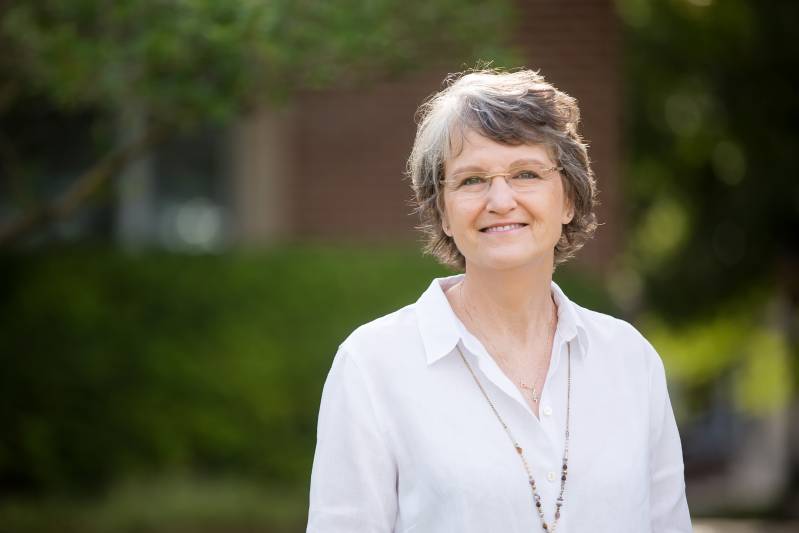MC Communication Faculty Demonstrates Commitment to Profession by Earning PR Credential

The world of communication presents an ever-changing landscape for J. Mignon Kucia.
For example, when the professor of communication at Mississippi College obtained her doctorate, social media didn’t exist. Try finding a way to communicate with companies, corporations, and the public without using some form of the electronic technology today.
“We have to understand how the laws that affect social media are changing the way we do business,” Kucia said. “We have to keep up with how artificial intelligence is changing the way that we communicate.
“If I want to be good at what I do, I’ve got to keep up with the latest information.”
To that end, the beloved communication faculty member and 2016 Mississippi Humanities Council Teacher of the Year at MC continued to demonstrate her mastery of strategic communications practice by earning her Accreditation in Public Relations.
The Universal Accreditation Board, a consortium of nine professional communication organizations that directs the competency certification program, has awarded the APR to Kucia. The accreditation program improves the practice of public relations by assessing competence in 60 areas of knowledge, skills, and abilities associated with the profession.
The APR is designed for public relations professionals with at least five-to-seven years of job experience and/or a bachelor’s degree in a communication field. Kucia obtained her bachelor’s and her doctorate in mass communication from the University of Southern Mississippi and her master’s at Mississippi College.
“Earning the APR reflects a mastery of the knowledge, skills, and abilities needed to succeed in our increasingly complex profession,” said Joy Carter, Universal Accreditation Board chair. “Practitioners who achieve the designation are demonstrating their commitment, not only to our profession, but also to a strong code of ethics and to the betterment of their organizations and clients.”
Reid Vance, professor and chair of communication at MC, said Kucia’s accomplishment demonstrates the faculty’s commitment to providing a world-class education for its undergraduate and graduate students.
“We’re all grateful for Dr. Kucia’s service to our students and the University,” Vance said, “and we’re proud of the quality of our communication graduate programs that continue to produce the very best practitioners in the discipline of public relations.”
Kucia’s accomplishment proves that education doesn’t stop – even after you’ve obtained a terminal degree and taught others for several years.
“What I learned in this process will allow me to be a much more effective professor as I work to train the next generation of practitioners,” she said.
A Clinton resident, Kucia is an active member of the Public Relations Association of Mississippi (PRAM). She was among three members of her cohort to earn the APR. The others – Chrystelle Thames, communications director at Mississippi Baptist Children’s Village, and Jan Schaefer, communications director of the Mississippi Department of Environmental Quality – both obtained their master’s from the MC Department of Communication.
“We are honored to have Dr. Mignon Kucia, Chrystelle Thames and Jan Schaefer as PRAM Central members and congratulate each on this well-deserved achievement,” said Jean Cook, 2023 PRAM Central president. “The APR process alone can take up to one year and demonstrates genuine dedication to the profession.
“Their commitment to excellence is truly inspiring.”
Kucia said it’s notable that all three newly minted APRs are MC Department of Communication alumni.
“That’s one of the things we talked about during the process: we were all well prepared to meet the standards for the APR,” the Columbia native said. “I didn’t teach them myself, but MC’s program is strong and the training is exceptional.”
In fact, the primary reason Mignon decided to obtain her accreditation was to better serve MC’s students.
“Going back and learning that body of knowledge from the ground up reminded me of things that perhaps I had let slip,” she said. “It made me a better teacher in that I can articulate the values and the process and the profession much more clearly that I might have done before.
“Another goal was for MC’s public relations program to gain accreditation from the Public Relations Society of America. In order to sponsor a PRSA chapter, a faculty member must be an APR. Obtaining this certification allows me to set up a series of steps that may result in our receiving that accreditation.”
She credits the Office of Faculty Development at MC for providing the resources needed for her to pursue accreditation. Her greatest challenge was time management.
“It’s a three-series process,” she explained. “You prepare a portfolio that illustrates your understanding of the profession and present it to a panel of three peers. You write a narrative, a series of reflections, about your experiences. And you prepare for a test about the history, ethics, and process that we go through as communication professionals.
“It took time away from other projects I was working on, but I’m glad I did it.”
Professionals earning the APR must renew their credentials through continuing professional development, providing leadership to the profession, and serving their local communities.
Sign-up For Our Newsletter
Get the latest news about Mississippi College delivered right to your inbox by subscribing to the Along College Street e-newsletter.


